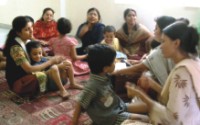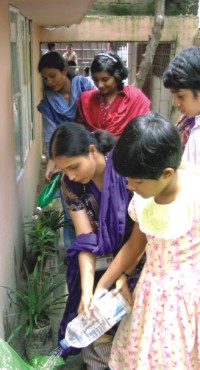|
Endeavour
Facing
Autism with
Pragmatism
Mashruk
M. Huq
 About
seven or eight years ago, I watched the movie Rain Man.
What a classic, (a worthy acting gig from Tom Cruise for a
change). Dustin Hoffman was simply masterful. From that movie
was my first encounter with the term autism. As Hoffman's
character in the movie "Raymond Babbitt" was autistic.
Exceptionally unconventional, Hoffman's character could calculate
cards at the casino and solve complicated math problems faster
than a calculator. About
seven or eight years ago, I watched the movie Rain Man.
What a classic, (a worthy acting gig from Tom Cruise for a
change). Dustin Hoffman was simply masterful. From that movie
was my first encounter with the term autism. As Hoffman's
character in the movie "Raymond Babbitt" was autistic.
Exceptionally unconventional, Hoffman's character could calculate
cards at the casino and solve complicated math problems faster
than a calculator.
The majority
of the people of our (advanced-in-the realm-of-cell phones-and-pirated-DVD's)
country are completely in the dark about autism. I've spoken
to people from various age groups about autism in the last
week and not one of them had a clear idea of what the word
even means. Two or three that had heard about it, said something
along the lines of, "Is it like, when people are, uhm,
crazy?"
 Autism
is a life-long developmental incapacity that appears before
the age of three. More common than childhood cancer or Down
syndrome, it's a "spectrum disorder", which means
the predicament has wide-ranging scales of severity. Autism
hinders individuals from properly understanding what they
see, hear and sense. From early childhood there is severe
impairment in communication and social interactions, and actions
are often repetitive and static. The degree of severity differs
from person to person, but every case of autism displays an
impairment in social interaction, social communication and
imagination. Autistic people can't interpret facial expressions
or emotions, yet one autistic person in 10 demonstrates brilliant
proficiency in the vicinities of music, calculation or memory. Autism
is a life-long developmental incapacity that appears before
the age of three. More common than childhood cancer or Down
syndrome, it's a "spectrum disorder", which means
the predicament has wide-ranging scales of severity. Autism
hinders individuals from properly understanding what they
see, hear and sense. From early childhood there is severe
impairment in communication and social interactions, and actions
are often repetitive and static. The degree of severity differs
from person to person, but every case of autism displays an
impairment in social interaction, social communication and
imagination. Autistic people can't interpret facial expressions
or emotions, yet one autistic person in 10 demonstrates brilliant
proficiency in the vicinities of music, calculation or memory.
Enter
Dr. Rownak Hafiz, Chairperson of the Autism Welfare Foundation
(AWF) - the first of its kind in Bangladesh. Soft spoken and
sharp, Dr. Rownak Hafiz has dedicated her life to the cause
of conveying awareness and dealing with autism. She is the
epitome of patience. "Without patience you'll never be
able to understand that autistic children do communicate...
they just have their own, unique ways of doing it. At AWF,
our motivation and foremost priority is to try and ensure
that these children can grow up to lead as normal lives as
possible," she explains.
April
4th, 2004 saw the birth of the Autism Welfare Foundation.
A non-profitable, non-government, welfare organisation, AWF
was created with the aim of guiding and educating autistic
children to achieve and pursue their utmost strengths and
interests, and of course, to ensure autistic children are
one day able to sustain themselves. Presently, AWF is operating
a training/education centre which provides one-on-one intensive
education for autistic children and adolescents. The emphasis
is given on communication and social skills, behaviour and
functional academics. AWF also runs a vocational training
center for students above 10 years of age.
 "My
own (teenage) daughter is autistic, so I know what parents
(can) go through," asserts Dr. Hafiz. "I've been
dealing with this since the early '90s, and let me tell you
quite frankly that back then, some of the major medical institutions
in Bangladesh boldly stated that my daughter was not autistic.
It was only after I had her examined at University of Iowa
(USA), that we were certain of her autism. That's where I
observed, learned and understood what autism truly is, and
how autistic children need to be cared for." "My
own (teenage) daughter is autistic, so I know what parents
(can) go through," asserts Dr. Hafiz. "I've been
dealing with this since the early '90s, and let me tell you
quite frankly that back then, some of the major medical institutions
in Bangladesh boldly stated that my daughter was not autistic.
It was only after I had her examined at University of Iowa
(USA), that we were certain of her autism. That's where I
observed, learned and understood what autism truly is, and
how autistic children need to be cared for."
Dr. Rownak
Hafiz and her staff of 20 instructors and some 10 assistants
granted me the privilege of an extensive tour of AWF. Located
in Shyamoli, Dhaka, Dr. Hafiz and her staff care for 38 autistic
children at AWF premises. I was honestly preparing myself
to sight some poignant faces during my visit there, but to
my complete surprise, I was privy to some remarkably positive
and lively children at the organisation. The little ones greeted
me with bashful handshakes, surprised glances and excited
smiles; one of them pulled me down for a peck on my cheek.
"They feel comfortable here," explains Dr. Hafiz.
"Some of the children you see barely even played with
toys not too long ago. Now, not only do they play, some actually
ask for things by referring to pictures on the classroom walls.
That in itself is a major improvement in an autistic child."
I thought these children were sick...? What then, pray tell,
is the "cure"? "There is no quick remedy or
magic cure for autism," she replies with a smile. "Their
routine of learning, playing, colouring, singing, weekly outings
etc - those are the best ways to keenly observe them, socialise
them and make them feel comfortable in everyday society. Thus
we're able to learn and subsequently deal with the autistic
characteristics of each child."
 80
per cent of autistic people are male. It's key to remember
that autism is a brain based developmental disorder, and not
a result of poor parenting. However, due to a lack of education
in remote areas of Bangladesh, parents are unaware that their
loved ones may very well be the victims of a problem that
a local doctor, priest or witch doctor can't cure. "The
biggest obstacle we now face is the extreme lack of social
awareness," adds Dr. Rownak Hafiz. "Plus, we could
definitely use some financial support to help us reach the
word of autism in villages and small towns. Only through the
involvement of parents, professionals, teachers and the general
public will there be proper clarity and understanding of autism
throughout our country." 80
per cent of autistic people are male. It's key to remember
that autism is a brain based developmental disorder, and not
a result of poor parenting. However, due to a lack of education
in remote areas of Bangladesh, parents are unaware that their
loved ones may very well be the victims of a problem that
a local doctor, priest or witch doctor can't cure. "The
biggest obstacle we now face is the extreme lack of social
awareness," adds Dr. Rownak Hafiz. "Plus, we could
definitely use some financial support to help us reach the
word of autism in villages and small towns. Only through the
involvement of parents, professionals, teachers and the general
public will there be proper clarity and understanding of autism
throughout our country."
Scientists
still don't know what actually causes autism, though genetic
factors are questioned. Research has also shown that autism
may be linked to a range of conditions affecting brain maturity
that occur before, during or very soon after birth. "I
firmly believe that early intervention is the most competent
device when it comes to dealing with autism. The sooner an
autistic child gets the proper attention, the better chances
s/he will have of leading a normal life," says Hafiz.
The
Autism Welfare Foundation is located at House # 428, Road
#2, Baitul Aman Housing Society, Shyamoli, Dhaka.
Dr. Rownak Hafiz can be reached at 8121759 or 0189447233.
Copyright
(R) thedailystar.net 2004
|
